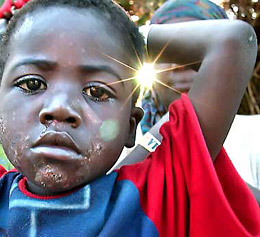
|  |  |  Americas & Beyond | December 2009 Americas & Beyond | December 2009  
Report Says 225,000 Haiti Children Work as Slaves
 Evens Sanon & Jonathan M. Katz - Associated Press Evens Sanon & Jonathan M. Katz - Associated Press
go to original
December 23, 2009


| | (Friends of the Children of Haiti) |  |
Port-Au-Prince, Haiti — Poverty has forced at least 225,000 children in Haiti's cities into slavery as unpaid household servants, far more than previously thought, a report said Tuesday.

The Pan American Development Foundation's report also said some of those children - mostly young girls - suffer sexual, psychological and physical abuse while toiling in extreme hardship.

The report recommends Haiti's government and international donors focus efforts on educating the poor and expanding social services such as shelters for girls, who make up an estimated two-thirds of the child servant population.

Young servants are known as "restavek" - Haitian Creole for "stays with" - and their plight is both widely known and a source of great shame in the Caribbean nation that was founded by a slave revolt more than 200 years ago.

Researchers said the practice is so common that almost half of 257 children interviewed in the sprawling Port-au-Prince shantytown of Cite Soleil were household slaves.

Most are sent by parents who cannot afford to care for them to families just slightly better off. Researchers found 11 percent of families that have a restavek have sent their own children into domestic servitude elsewhere.

Despite growing attention to the problem, researchers said their sources were unaware of any prosecutions of cases involving trafficking children or using them as unpaid servants in this deeply poor nation of more than 9 million people.

Glenn Smucker, one of the report's authors and a cultural anthropologist known for extensive work on Haiti, said he believes the number of restavek children is increasing proportionally with the population of Port-au-Prince as more migrants flee rural poverty to live in the capital.

The researchers surveyed more than 1,400 random households in five Haitian urban areas in late 2007 and early 2008, with funding help from the U.S. Agency for International Development.

The most widely used previous number for restaveks came from a 2002 UNICEF survey, which estimated there were 172,000.

The new report used a broader counting system to include children related to household owners but still living in servitude, such as nieces or cousins, and as well as "boarders" living temporarily with another family but are still forced to provide labor.

"Most people working with restavek children ... think that these numbers, both ours and UNICEF's, are actually underestimating the problem," said Herve Razafimbahini, the Pan American Development Foundation's program director in Haiti.

He called for Haitian officials to conduct a national survey to analyze the full scope of the problem, including in rural areas.

Officials with the Ministry of Social Affairs could not be reached for comment Tuesday.

Associated Press writers Evens Sanon reported this story from Port-Au-Prince and Jonathan M. Katz reported from San Juan, Puerto Rico.
|

 |
|  |



